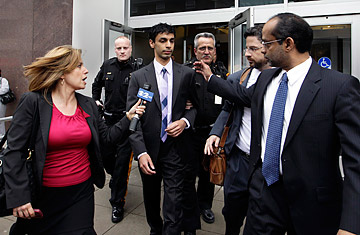
Dharun Ravi, center, is helped by his father Ravi Pazhani, right, as they leave court in New Brunswick, N.J., at around noon on March 16, 2012
We can't know what Tyler Clementi would have wanted. In September 2010, he threw himself from the George Washington Bridge and ignited a national outcry against bullying. On Friday, March 16, Dharun Ravi, his former roommate at Rutgers University, was convicted on criminal charges of intimidating Clementi for being gay. The conviction could lead to Ravi's quick deportation — if the 20-year-old Indian immigrant is lucky. Ravi may have to serve prison time as well.
Within an hour of the release of the verdict against Ravi, the Web community devoted to Clementi's case erupted in righteous satisfaction. "Justice been served," wrote one poster on one of Clementi's commemorative Facebook pages. But was justice done?
The jurors had to decide unanimously whether Ravi was guilty of 35 separate counts. They found him guilty on 24 of the 35. Most of the charges hadn't been disputed in the trial. Ravi's lawyers never denied that he secretly observed Clementi in a sexual situation (Count 1) and that Clementi's partner — identified throughout the trial only as "M.B." — had also been secretly observed (Count 2). (Click here if you want a breakdown of every charge.)
But the trouble begins with Count 3: Did Ravi invade Clementi's privacy with the purpose of intimidating him because of his sexual orientation? The jurors said no. They also acquitted Ravi on charges of "knowing" that Clementi would feel intimidated after the webcam incident. Instead, Ravi was found guilty on the razor-thin charge of invading Clementi's privacy "under circumstances that caused Tyler Clementi to be intimidated." In other words, the jurors found that Ravi not only didn't intend to commit a crime but didn't even know he was committing a crime. Instead, he is guilty merely of setting up "circumstances" — a webcam — that caused Clementi to feel intimidation.
Never mind that we can't ask Clementi what he actually felt. What we do know is that the day after Clementi first hooked up with M.B., he instant-messaged a friend to make clear that he knew Ravi had spied on him briefly and didn't seem to care. "[I]ts not like he left the cam on or recorded anything," Clementi wrote. "He just like took a five sec peep lol."
At trial, Ravi's lawyers said he set up the webcam because M.B. seemed older than a college freshman (which was true — he was at least five years older) and because Clementi had asked for all-night privacy in their dorm room even though he and Ravi were barely acquainted. Ravi and Clementi had never really clicked as roommates, and each had sent foolish and brutish texts about the other to friends. Ravi expressed adolescent disgust at Clementi's homosexuality, and Clementi made crude jokes about Ravi's Indian heritage — "defs owna dunkin," he wrote, meaning Ravi's family must own a Dunkin' Donuts. (For a masterly reckoning of their relationship and the crime, read Ian Parker's New Yorker piece.)
And yet only one of these young men committed suicide. Clementi may have been trying to downplay Ravi's invasion of his privacy, but he was still hurting. Around 4 a.m. on Sept. 21, 2010, roughly 18 hours after the webcam incident, Clementi logged on to a Rutgers website and requested a room change.
Twelve hours later, though, he felt good enough to text Ravi and ask for privacy in the room again. M.B. was going to return. Ravi seems to have gotten angry. "Anyone with iChat, I dare you to video chat me between the hours of 9:30 and 12," he tweeted. "Yes, it's happening again." M.B. testified at trial that he covered the webcam that night before he and Clementi hooked up again.
All these details muddle the picture, and the jurors in the Ravi trial were left with a mess. New Jersey has robust antidiscrimination laws — some of the strongest in the U.S. — and the jurors had to rely on the fine print of the text. What they ultimately decided is that because Ravi invited his friends over to watch Clementi get it on a second time, he knew Clementi would be intimidated. But the second viewing never happened — M.B. covered the webcam before engaging in activity with Clementi, which suggests both of them knew what Ravi was trying to do.
The uncertainties dive into the main question: What would Clementi have wanted? He was a young musician, a bespectacled and fledgling intellectual, a gay man who had just come out to his parents. He was barely able to define himself, and so it seems unlikely that he would have wanted to define Dharun Ravi's future as one of a criminal imprisoned by his new country and then ejected from it.
